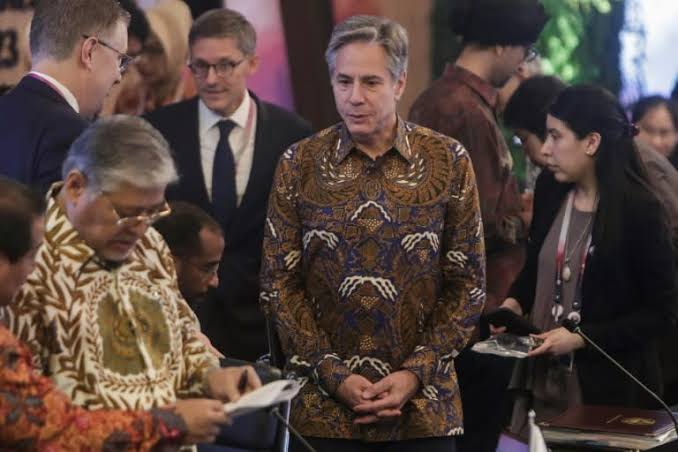US, EU assail Russia in rare meeting in Southeast Asia

The US and European Union’s top diplomats on Friday assailed Russia’s foreign minister as being negative and unconstructive in a rare sit-down appearance with him at a Southeast Asian gathering in Jakarta.
US Secretary of State Antony Blinken seized on the two days of meetings to hold fresh talks with China on managing tensions, even as he sought to rally Southeast Asian nations against “coercion” by Beijing.
Blinken made no such effort to meet Russian Foreign Minister Sergei Lavrov, who spoke behind closed doors at a session that brought in global powers.
Lavrov’s involvement was “not constructive or productive” and he offered a “totally negative presentation and agenda”, Blinken told reporters after the talks in Jakarta.
He said Moscow’s top diplomat “effectively ascribed every problem in the world to the United States”.
The European Union’s foreign policy chief, Josep Borrell, similarly said that Lavrov spoke “very aggressively” and vowed that Moscow’s war in Ukraine would continue.
Lavrov said “everything is a ‘West conspiracy’ and the war will continue… as Russia is not at all ready to stop the aggression and withdraw troops”, Borrell said.
The Russian foreign minister did not speak to media following the meeting.
In an interview with Indonesian media earlier this week, Lavrov said the war in Ukraine would not end until Western nations give up their efforts to “defeat” Russia.
Blinken and Lavrov last saw each other in March in New Delhi, where they spoke briefly in person for the first time since Russia’s invasion of Ukraine, in part about Washington’s hopes to free detained US citizens.
US officials say that Russia is not serious about talks to end the war, although a number of powers in the developing world have been pressing for diplomacy and have refused to join Western efforts to isolate Russia.
President Vladimir Putin, currently a pariah among the US and its allies, is expected to be welcomed in the coming months at summits in both India and South Africa.
Blinken said he told foreign ministers in Jakarta that the United States was “ready to support a just and lasting peace to the conflict” in Ukraine.
- Denouncing China ‘coercion’ –
Despite tensions with Russia, the United States sees its major long-term competitor as China and has sought common cause with Southeast Asian nations wary of Beijing.
“Like many countries in the region, we are concerned by the PRC’s growing assertiveness in the South and East China Seas and on the Taiwan Strait,” Blinken told reporters, referring to the People’s Republic of China.
Speaking earlier in the day to ASEAN foreign ministers, Blinken used more veiled language as he called for an Asia that is “free, open, prosperous, secure, connected and resilient”.
“That means a region where countries are free to choose their own paths and their own partners, where problems are dealt with openly — not through coercion,” he said.
Friction has been rising for years between Beijing and Southeast Asian nations, particularly Vietnam and the Philippines, over China’s sweeping maritime claims.
Tensions have also soared over Taiwan, the self-governing democracy which Beijing claims and has not ruled out seizing by force.
Host Indonesia warned that ASEAN should not become a proxy for global rivalries.
“The Indo-Pacific must not be another battleground,” Indonesian Foreign Minister Retno Marsudi told ministers of the 18-nation East Asia Summit, which includes the United States, China and Russia, as well as Japan, India and Australia.
- Talking through China tensions –
The United States and China have nonetheless been working to prevent disagreements from spiraling out of control.
Blinken met Thursday evening for more than an hour and a half with China’s foreign policy supremo Wang Yi, less than a month after the top US diplomat paid a rare visit to Beijing.
Blinken said he told Wang that Washington would take “appropriate action” against hackers after a breach of US government email accounts that US tech giant Microsoft blamed on Chinese state-backed actors.
Wang urged Washington to “work with China in the same direction” to improve ties and stop interfering in China’s affairs, according to a statement on Friday by the foreign ministry in Beijing.
Australian Foreign Minister Penny Wong held her own meeting with Wang on Thursday and said she had urged Beijing to “navigate our differences wisely” and provide “transparency” on a controversial policing pact with Solomon Islands.
Japanese Foreign Minister Yoshimasa Hayashi also met Friday with Wang, where Tokyo and Beijing traded barbs over the former’s plan to discharge treated water from the Fukushima nuclear plant.
The ASEAN talks have been dominated by the crisis in Myanmar. The bloc refused to invite the country’s military junta, which seized power in February 2021.
With Myanmar’s chair at the table conspicuously empty, Blinken urged more pressure.
North Korea also sent an official to Jakarta, even as it announced this week a test of its latest intercontinental ballistic missile.
South Korean Foreign Minister Park Jin, meeting jointly with Blinken and Hayashi, said that the three allies needed to send a message to North Korea “that their provocations will not go unpunished”.
©️ Agence France-Presse












